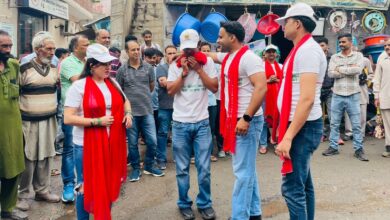Navigating the Political Landscape: BJP’s Long-Term Vision for Kashmir
Only time will tell how this gamble plays out, but one thing is certain: the political landscape of Jammu and Kashmir is undergoing a significant transformation, and the BJP's role in shaping its future remains a crucial factor to watch.
By King C Bharati
 The Jammu and Kashmir political scene is abuzz with speculation and debate, following the Bharatiya Janata Party’s (BJP) decision to abstain from fielding candidates in the three Lok Sabha seats of the Kashmir Valley. This strategic move has sparked a range of reactions, from criticism to cautious optimism, leaving many wondering about the party’s long-term goals in the region.
The Jammu and Kashmir political scene is abuzz with speculation and debate, following the Bharatiya Janata Party’s (BJP) decision to abstain from fielding candidates in the three Lok Sabha seats of the Kashmir Valley. This strategic move has sparked a range of reactions, from criticism to cautious optimism, leaving many wondering about the party’s long-term goals in the region.
The BJP’s justification for their absence in the Kashmir Valley elections centers around the idea of supporting “patriotic” parties. Jammu and Kashmir BJP chief, Ravinder Raina, emphasized that while the party was initially keen on contesting all three seats, sometimes “decisions are made to achieve a big goal”. This suggests a strategic retreat, prioritizing broader objectives over immediate electoral gains.
Raina further elaborated that the BJP is extending its support to parties committed to the betterment of Kashmir, fostering peace and brotherhood, and serving the community. While the identities of these parties remain undisclosed, the BJP assures its workers and supporters that they will soon be revealed, allowing them to vote accordingly.
The BJP’s decision has placed its allies, the People’s Conference and Apni Party, in a delicate position. These parties, contesting in Baramulla, Srinagar, and Anantnag-Rajouri, find themselves hesitant to publicly acknowledge their association with the BJP. This reluctance stems from the potential backlash in a region where the BJP’s stance on Article 370 remains a contentious issue.
This situation has inadvertently benefitted the National Conference (NC) and the Jammu and Kashmir People’s Democratic Party (PDP). These traditional rivals, engaged in a close contest across the three constituencies, have shifted their focus from each other to the BJP. This shared adversary has fostered a sense of unity, with both parties aiming to capitalize on the public sentiment against the BJP’s policies in the region.
Omar Abdullah, the National Conference leader, questioned the BJP’s claims of development and progress in Jammu and Kashmir post-Article 370 abrogation. He pointed out the party’s absence from the Kashmir Valley elections as a sign of their awareness of their standing in the region.
The NC and PDP have been vocal in their criticism of the BJP, highlighting the perceived erosion of identity and land rights, and the lack of tangible development initiatives. They have also criticized the BJP’s alliance with the PDP in the past, accusing them of betraying the trust of the people.
The BJP’s decision to back allies instead of directly contesting in the Kashmir Valley elections is a gamble with uncertain outcomes. While it allows them to maintain a presence in the region without directly facing the electorate, it also exposes them to criticism and accusations of backdoor politics.
The success of this strategy hinges on the performance of their allied parties and their ability to translate the BJP’s support into electoral victories. However, the NC and PDP, emboldened by a common adversary, are likely to present a formidable challenge, making the outcome of the elections difficult to predict.
The BJP’s Kashmir strategy reflects a complex political landscape where alliances shift, and strategies evolve. The party’s decision to step back from direct confrontation may be a calculated move to consolidate its position in the long run, or it could be a miscalculation that weakens its influence in the region.
Only time will tell how this gamble plays out, but one thing is certain: the political landscape of Jammu and Kashmir is undergoing a significant transformation, and the BJP’s role in shaping its future remains a crucial factor to watch.
Economic development and opportunities play a crucial role in shaping the political landscape of any region. The BJP’s focus on infrastructure development and investment in Jammu and Kashmir is a positive step, but it needs to be accompanied by measures that ensure equitable distribution of benefits and create sustainable livelihoods for the local population.
Empowering the youth through education, skill development, and employment opportunities is essential to address the sense of alienation and prevent them from falling prey to extremist ideologies.
The BJP’s Kashmir strategy is still evolving, and its success will depend on its ability to adapt to the region’s complex dynamics. Open dialogue, inclusivity, and trust-building are essential ingredients for a sustainable and peaceful future for Jammu and Kashmir.
The BJP needs to move beyond electoral calculations and adopt a long-term vision that prioritizes the well-being and aspirations of the Kashmiri people. Only then can it truly achieve its goal of integrating the region into the national mainstream and usher in an era of peace and prosperity.







